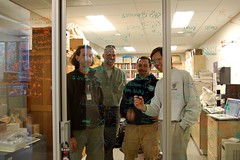A number of various media individuals have made statements to the effect that "Climategate" is an appropriate way to handle the hacking (not leaking) of e-mails from a server of the climate modeling group at the University of Norfolk. Because, they say, it's a bit like Watergate isn't it? No, it isn't. Am I just old enough to actually remember Watergate? I don't think so; I was just a kid! Anyway, here is a link to a BBC editorial from a couple of academics in the UK, proposing a new model for science. Read it here. I think that they are way off-mark. I tried to tell them so, but they haven't published my comments. Reminds me that I should complete my "Six Degrees of Responsible Science" series of posts. So you can take a look at their article, and here's my comment...
As a professional scientist, I will say that this is very thoughtful argument. I will also say, on the other hand, that the revelations from the Norfolk e-mails are simply not as damaging, nor as full of subterfuge as agenda-driven climate change skeptics have been claiming. The real problem is that while modern science is an objective process for determining mechanisms in nature, scientists are human. So yes, they, we, must be mindful and held accountable for all the social things that humans tend to do in the practice of anything, from business to religion to parenting. I depart from your article, however, when you insist that somehow the scientific process can benefit from the inclusion of review by non-scientists. I am no more qualified to argue a fine legal point against a solicitor than the solicitor is qualified to argue with me about the interpretation of oxygen isotopic data from a glacial core. Yet I know a bad law when I see one. Therefore, while I agree that extended scrutiny of arguments by the general public for purposes of policy is definitely a good idea, there is no way, absolutely none, that the validation of knowledge can take place outside of a scientific context. That smacks of the old style Vatican.
